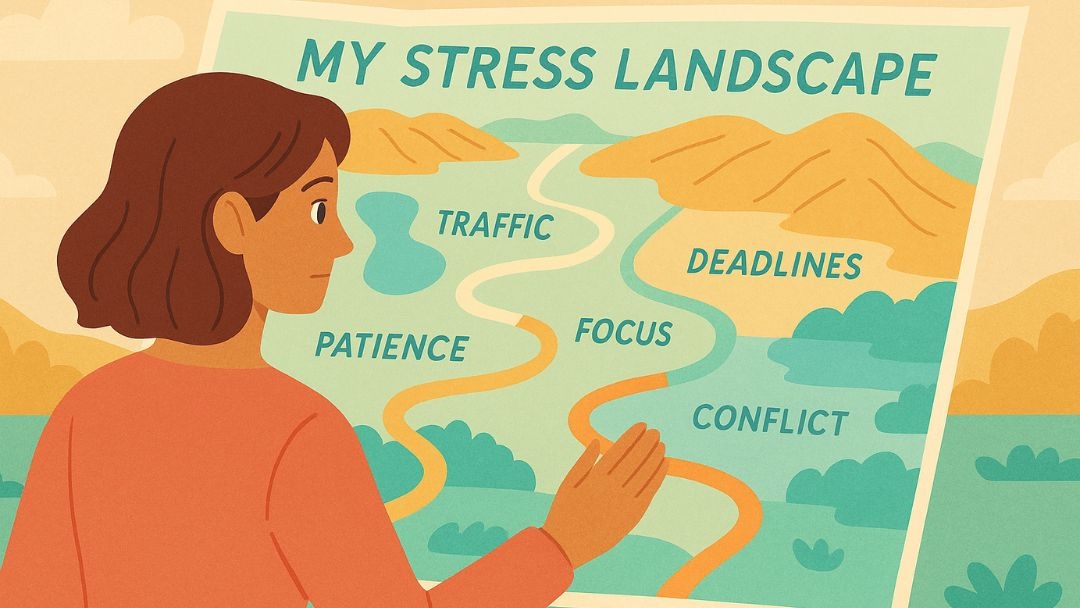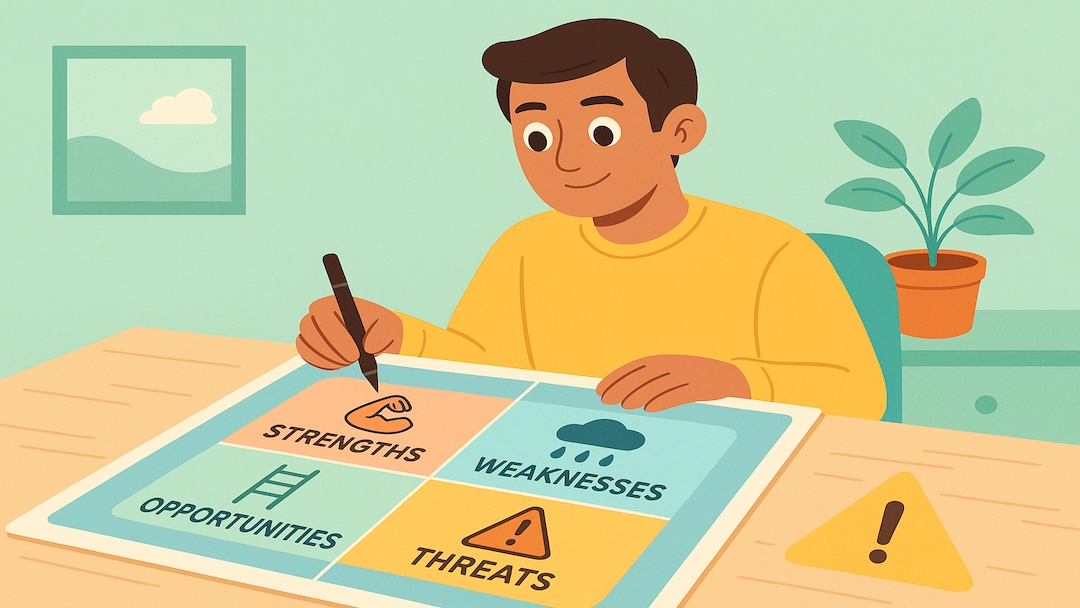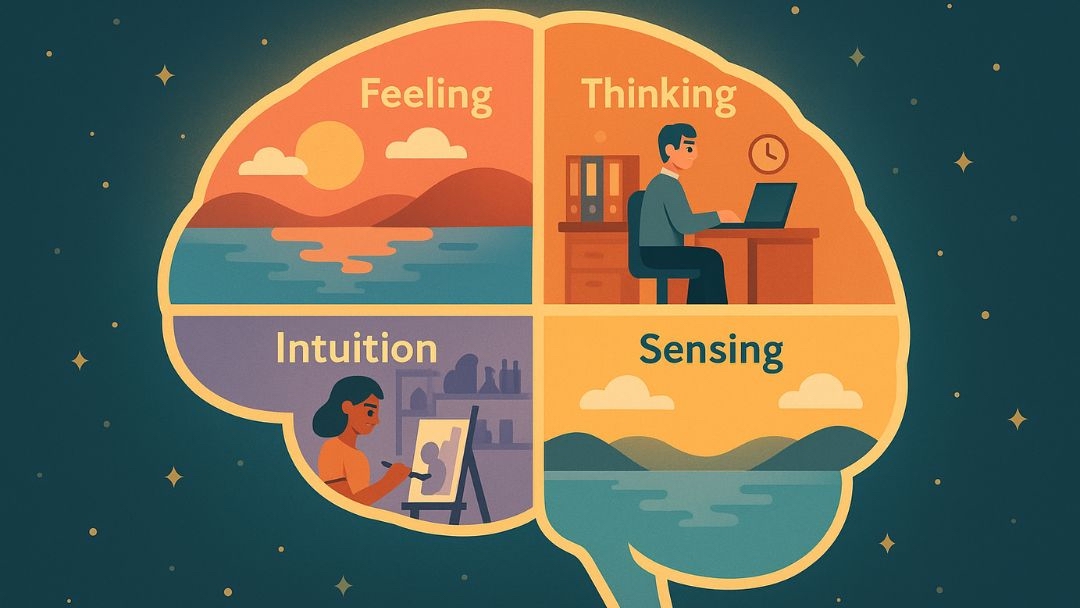How Do You Handle Stress? Understanding Your Personality Can Help You Cope
We all deal with stress in different ways, depending on our personality. Understanding your personality’s strengths and weaknesses can help you identify your stress triggers, how you behave under pressure, and the best way to deal with it. Learn how the different MBTI types handle stress.


Back
12 mins read
Have you ever studied the reactions of commuters in a traffic jam? Or watched passengers in a plane as it tried to take off? While some people usually appear calm in those situations, you can quickly notice signs of stress in others.
Why do people react differently to stressful situations?
Although everyone experiences stress, we are unique, and so are our stress triggers. What stresses you out may be a source of comfort for another person.
Experts believe that your personality plays a significant role in determining how you handle stress. Every personality trait has strengths and weaknesses. Your weaknesses usually determine your vulnerability to stress.
For example, someone who is closed to new experiences would generally experience stress when forced to interact with strange people outside his comfort zone. The stress might disappear if this same person sees a few familiar faces. It proves that people usually turn to their strengths to overcome stressful situations.
It is necessary to identify the strengths and weaknesses of our personality when trying to manage stress.
When we learn these things, we can prepare for the inevitable and equip ourselves with the tools for handling stress effectively. We aim to examine the stress triggers of each MBTI personality type, how they behave when experiencing stress, and their coping strategies to overcome stress. If you don't know your MBTI personality, you can take a test to find out.
But first, let's help you understand why you must understand your strengths and weaknesses to manage stress effectively.
5 Ways Knowing Your Strengths and Weaknesses Can Help You Manage Stress

When dealing with a practically unavoidable yet potentially damaging situation like stress, you must spare no effort to nip it in the bud. Doing this requires a genuine understanding of your strengths and weaknesses and a readiness to develop a realistic action plan to achieve your goal.
Understanding your strengths and weaknesses helps you limit your vulnerabilities and build your stress response. Here are five reasons this knowledge is essential for stress management.
1. It Helps Limit Your Vulnerabilities
The easiest way for stress to creep in is by exploiting your weaknesses. Once you understand your weaknesses, you can limit your vulnerability and prepare for potentially stressful situations.
If your weakness is impatience, being stuck in traffic would stress you out. You may limit your exposure by identifying this weakness and preparing ahead. If you experience traffic jams regularly on your way to work, you may use that time to get other things done, like checking up on your friends, listening to an audiobook, etc. You may also avoid the situation in the first place by going to work early.
2. Knowing Your Strengths Helps You Combat Stress
Managing your weaknesses to prevent stress is easier said than done. And even if you did it effectively, some things are out of your control. How do you prevent the loss of a loved one or a natural disaster like a flood or hurricane? These situations will stress you out, and the best way to react is to channel your strengths to overcome that trying time.
Most people turn to their strengths when dealing with stress because it is more effective than trying to eliminate the weakness that caused the stress. If you're trying to understand a topic but easily get bored when you read abstract topics, the solution isn't figuring out how to eliminate boredom. Perhaps creativity is your strength. You can try other ways to learn the topic by exploring audio learning or watching an explanatory video.
3. Using Your Strengths Wisely Can Help Avoid Stress
Your strengths can cause problems when you overuse them. Just because you are a great writer doesn't mean you should take on more work than you can complete within the specified period. Apart from recognizing your strengths, using them wisely can also help you avoid stress.
4. Diagnosing the Cause of Stress is Essential to Tackling Stress
Identifying your strengths and weaknesses enables you to diagnose why a situation is causing stress. Two people may show signs of stress in a similar situation but for entirely different reasons.
Take commuters held up in traffic as an example. One person may be stressed due to a lack of patience, while the other may fear running late. The first person can solve his immediate stress issues by getting other things done while in traffic, but the other person can only eliminate his stress if the traffic clears up.
Related: Exploring the Effects of Chronic Stress on the Brain
How to Write a Personal SWOT Analysis for Stress Management

Stress management is one of the numerous benefits of a personal SWOT analysis. A SWOT analysis assesses the internal factors we can control ( our strengths and weaknesses) and external factors (opportunities and threats) we have no control over.
If you are new to conducting a SWOT analysis, you may want to read this article.
In a personal SWOT analysis for stress management, your strengths should include good qualities, experience, favorable personality traits, and soft skills to help you manage stress. Your weaknesses should include poor qualities, bad habits, toxic relationships, previous failures in handling stress, and skills you lack.
Your opportunities are external factors that can eliminate stressful situations or help you cope better. It could be an opportunity to learn new skills to manage stress, an incentive to deal with stress, or changes in your immediate environment to limit the appearance of stress triggers. Your threats are external factors that cause or aggravate stress. It may also include the risks associated with allowing the stress to persist.
A personal SWOT analysis aims to maximize strengths, improve weaknesses, take advantage of opportunities, and eliminate threats. When conducting a personal SWOT for stress relief, it Is important to consider your individual personality traits and how they impact your reaction to stressors. After identifying all the categories, develop an actionable plan to help you manage stress effectively.
How Each MBTI Personality Type Deals With Stress

As individuals, we all have different things that bother us and different ways of dealing with stressors. But as unique as we each are, there are some patterns that are consistent with specific Myers-Briggs Personality types.
Under low-stress situations, it's common for people to over-indulge in things they do well, hoping to find a solution or avoid the problem. But overdoing something good doesn't always lead to something positive.
In contrast, under extreme stress, people may start doing things against their nature. Why is this?
Stress generally exploits people's weaknesses and makes them feel helpless. However, if you understand the strengths and weaknesses of your personality, you are better equipped to limit your vulnerabilities and use your strengths to handle stressful situations when they arise. For example, the 16 MBTI types can often predict how a person will react to stressors associated with holiday gatherings.
Let's examine each MBTI personality type's common stressors, behaviors, and coping strategies.
How Does the ISFP Personality Handle Stress?
Many things stress out an ISFP, but the most common stressors include rigid rules, lack of appreciation from others, criticism, conflict, lack of alone time, long-term planning, etc. When ISFPs suffer from chronic stress, they become passive-aggressive and build up to self-destruction or engage in unnecessary risky behaviors as the stress becomes more severe. They may also criticize others unfairly or obsess over other people's errors.
If you have an ISFP friend, let them have time alone to re-energize. Listen to them and appreciate them. Most importantly, encourage them to live in the moment and do what brings them comfort.
How Does the INFJ Personality Handle Stress?
Everyday stressors for INFJ include an extreme focus on the present, disrupted plans, criticism, noise, etc. Under minimal stress, they retreat to their comfort zone to re-energize. They try to use their intuition and big-picture thinking to handle stress. However, once the pressure becomes extreme, they often develop nasty habits like substance abuse, eating junk food, excessive smoking and drinking, etc., to suppress their emotions.
The INFJ must trust their intuition to make better choices to overcome stress. They should share their feelings with loved ones who will help them regain self-confidence. They should also spend time alone to re-energize.
How Does the INFP Personality Handle Stress?
An INFP can be stressed when faced with rigid rules, attacks on their values, fear of losing a loved one, small talk, etc. Under extreme stress, an INFP struggles to align their need for pleasing others with their love for setting personal boundaries. This inner struggle may cause them to become hostile or critical of themselves and everyone around them.
Let the INFP have time alone to re-energize and organize their feelings to overcome stress. Let them know their feelings are valid and invite them to participate in activities complementing their strengths.
How Does the INTJ Personality Handle Stress?
The INTJs are hard workers stressed out by working with lazy or incompetent people, being around excessive noise, multitasking on several important tasks, working somewhere their skills aren't appreciated, etc. Architects usually withdraw into their comfort zones and work even harder when they experience normal stress.
Under extreme stress, they may start making rash decisions without thinking through, like binge eating or alcoholism, to avoid their problems. They can become unnecessarily hostile or argumentative with those around them.
To overcome stress, let the INTJ utilize their strengths, such as intuition and logic, in making decisions. They should also focus on one important task at a time and find hardworking co-workers in a place where their skills are valued.
How Does the INTP Personality Handle Stress?
INTPs are creatives who love thinking of new ways to solve problems. However, they develop anxiety when stressed, which may affect their creative-thinking skills. High levels of stress cause them to act impulsively and experience mood swings. They become unnecessarily obsessed with details and may be prone to emotional outbursts.
While common stressors may include lack of freedom, repetitive tasks, having their privacy invaded, etc., they can overcome stress by having time to think, trusting their strengths to overcome problems, and engaging in creative projects.
How Does the ISTJ Personality Handle Stress?
The ISTJ's most common stressors include being in a chaotic environment, sudden changes that disrupt their plans, being forced to interact publicly, etc. Under minimal stress, they try to find solutions and maintain order using their tried and tested methods. Under extreme stress, ISTJs may lose their calm and abandon their trusted practices.
To overcome stress, help the ISTJ regain confidence in the proven problem-solving method. Let them find an environment where structure and order are valued to rediscover their sense of duty.
How Does the ISTP Personality Handle Stress?
Typical stressors for ISTPs include strict rules, abstract ideas with little real-life applications, controlling relationships, repetitive tasks, etc. When stressed, ISTPs may become paranoid and think others hate them, and they respond in kind. They lose their self-reliance and start trusting the opinion of others over their own.
The ISTP must regain confidence in themselves and their problem-solving ability to overcome stress. They should take some time off work and spend time alone.
How Does the ISFJ Personality Handle Stress?
ISFJ's most common stress triggers include asking others for help, being taken for granted in relationships, and taking on too much work. ISFJs usually feel at ease when they are in the best position to help others, but they may take on more than they can handle because they don't want to say no or burden others.
Stress may destabilize them and make them doubt their ability to defend others, but taking a break from everything can help them regain their strength and confidence.
How Does the ESTP Personality Handle Stress?
Some stress triggers for ESTPs include being restricted to rigid rules, long-term planning, abstract concepts, lack of control, etc. When ESTPs experience chronic stress, they stop living in the moment and start worrying about how things can go wrong in the future. Long-term stress takes away their fun-loving nature as they become paranoid and make decisions based on fear. To overcome this, ESTPs should find new and exciting adventures to take away the edge and remind them of what they love doing.
How Does the ESTJ Personality Handle Stress?
ESTJs dislike sudden changes, working on abstract concepts, disorganized environments, lazy colleagues, etc. When dealing with stress, they find it hard to express their feelings, so they isolate themselves from others. Extreme stress may also make them overly emotional and hypersensitive, causing them to lose their objectivity in making decisions.
To overcome stress, ESTJs should spend time with loved ones who will listen to them, avoid judging them, and help them rediscover their strengths.
How Does the ESFP Personality Handle Stress?
As fun-loving performers, nothing causes the ESFP more stress than solitude, strict rules, long-term planning, and boredom. Under minimal stress, they distract themselves by over-indulging in the present without regard for future consequences. Paranoia and moodiness may set in when the stress becomes severe. But instead of tackling the stress, they may retaliate against those causing it.
To overcome stress, ESFPs must eliminate negative thoughts, refocus on the present, and revel in the fun things in front of them. Talking to their loved ones also helps.
How Does the ESFJ Personality Handle Stress?
ESFJs care deeply about others and will go out of their way to help. However, they are prone to stress when people criticize them or fail to appreciate their efforts. Stress can bring a host of negative feelings. The caring ESFJ can be critical towards others when stressed.
Listen to and validate their feelings to help the ESFJ personality type overcome stress. Let them know how much you appreciate them. Remind them of how they've changed people's lives in the past.
How Does the ENFP Personality Handle Stress?
ENFPs enjoy giving praise just as much as they love receiving it. A lack of appreciation from others or criticism can hurt and stress them. They also experience stress when they do too much work to satisfy others, do repetitive tasks, or notice constraints on their creativity.
When stressed, ENFPs usually procrastinate, become hypersensitive, and avoid problems.
To overcome this stress, ENFPs should spend time with loved ones who will appreciate them and make them feel good about themselves, work on projects that allow them to flex their creative muscles, and learn to say no to avoid being overwhelmed.
How Does the ENFJ Personality Handle Stress?
ENFJs love making everyone happy, but they sometimes develop stress when they take on too much work or when their good intentions are misunderstood. Sometimes, they experience anxiety when people don't appreciate them or when they over-empathize with others and take on their problems.
When under extreme stress, ENFJs usually avoid the problem, hoping it will resolve itself if they pretend it doesn't exist. But all these emotions build up inside them, causing headaches and other physical symptoms. Eventually, they become self-critical and hostile towards others.
To overcome stress, the ENFJ should focus on helping themselves with the same energy they use to help others. Their loved ones should also appreciate their efforts and make them feel valued.
How Does the ENTP Personality Handle Stress?
An ENTP may experience stress when forced to stick to a routine and abide by rules. They do not enjoy being where their creative ideas are unappreciated or where everyone is micromanaged. Stress removes the ENTP's focus, making them feel anxious and incompetent. If ENTPs don't manage stress properly, they may lose their creativity and try to escape the situation rather than confront it.
An ENTP should try to sleep, exercise, and eat healthy foods to overcome stress. They should also debate new ideas with intellectual people to rediscover their greatest strengths.
How Does the ENTJ Personality Handle Stress?
The ENTJ's most common stress triggers are failed goals, laziness, incompetence, lack of vision, and not being in command. The ENTJs do not shy away from fights, so their first stress response is confronting anyone, or anything they believe is causing it. They may become emotionally unstable if stress persists, feeling angry and frustrated as they lose control over the situation.
To overcome stress, ENTJs must trust their abilities to tackle issues and allow others to help them when they feel they are losing control.
Related: Unveiling the Link Between Type A Personality and Stress, Burnout, and Depression
General Tips to Help You Manage Stress

The following tips are generally applicable to everyone, regardless of their personality. However, your personality may determine your approach and how easy it is to implement these suggestions.
For example, extroverts and introverts might share their feelings differently. While an extrovert may find it easy to talk to someone, an introvert may prefer pouring out their feelings in a journal. Type A personalities will also deal with things differently than Type B.
Following these tips will help you manage stress effectively.
- Learn to say no.
- Don't bottle up your emotions inside; talk to someone or pour out your feelings in a journal.
- Practice gratitude; say three things you're grateful for before dinner every day.
- Accept things you can't change.
- Avoid toxic and unhealthy relationships.
- Take care of your physical, mental, spiritual, and cognitive health.
- Eat healthy meals, exercise, and get adequate sleep.
- Avoid drugs and excessive smoking or drinking.
- Take a break from work to try out your hobbies.
Interview Question: How Do You Handle Stress?

Before we close, we want to leave you with of tips to handle one of the most common job interview questions: how do you handle stress?
When a hiring manager asks how you handle stress, you should give a real-life example of where you overcame the situation. The interviewer wants to know whether you have the skills needed to thrive when they turn up the heat. You should highlight relevant skills like adaptability, resilience, communication, problem-solving, creativity, time management, etc., and how you use them to handle your daily stress.
Remember that every detail you share is essential, so avoid painting yourself in a bad light even if you later redeem yourself. Talking about the time you procrastinated until the last minute to get a job done but still met the deadline due to your ability to thrive under pressure is a story with a happy ending. However, it shows the interviewer that you need help with time management. Instead of pointing out your procrastination, you can say that your manager assigned you a last-minute project.
Don't try to describe yourself as a perfect human being who doesn't experience stress.
This question isn't about how infallible you are; it's about whether you have the skills to weather the storm. Being ready for the question ahead of time is one of the things you can do to prepare for a job interview.


Return to Blog






